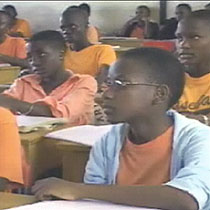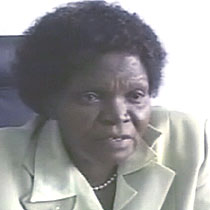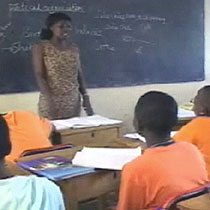-
(单词翻译:双击或拖选)
Kampala, Uganda
12 June 2007
Earlier this year, Uganda launched its Universal Secondary Education program to enable more students from low-income and rural families to get a high school education. Cathy Majtenyi files this report for VOA on the challenges and rewards that lie ahead.
 |
| Uganda students |
Until now, less than half of all students who finished primary school made it to secondary school, largely because their families were unable to afford the school fees.
But with the USE program, the Ugandan government is aiming to have at least 60 percent of primary school graduates move on to secondary school this first year
 |
| Geraldine Namirembe Bitamazire |
But providing spaces for so many students at once may prove to be easier said than done. When Uganda implemented2 its Universal Primary Education program 10 years ago, schools faced serious shortages of teachers, classrooms, learning materials and other equipment as they were being swamped with new students.
 |
Ms. Bitamazire, adds, "In the over-enrolled schools we are introducing what we call double-shift sessions, a school in the morning up to one (p.m.) and a school in the afternoon up to six (p.m.), because we cannot easily multiply the numbers of schools, but we can use one school for two schools in one day."
Joseph Apira is head teacher at Koro Secondary School in Gulu, northern Uganda. He describes his school's plans to accommodate 200 more students this year. "There are quite a number of changes that we are trying to make. One of them is to work up together with the parents in order to work together with the local community and put in more buildings. Secondly7, the non-governmental organizations who are in the area, they are helping8 to accommodate these students too -- constructing some classrooms for them so that the schools can cope up with that number. And the Ministry of Education is also coming up with these payments and their developmental policies."
The government says it is approaching outside donors to provide funds and other assistance for the secondary school program.
Tsuyoshi Okamoto works for the Japan International Cooperation Agency as an advisor9 to science and math secondary school teachers in Uganda. He says it may be difficult for the government to get this donor4 support. "We need more international attention on the secondary education. So far, what I observe -- this is my personal opinion -- is that most of the international donors stick with primary education. I understand that this is because of the [United Nations] Millennium10 Development Goals. They want to achieve these Millennium Development Goals and Uganda is on the right track."
If all goes according to plan, one million more students will be in the secondary school system in four years time. That will mean that 80 percent of children who finish primary school can get a high school education.
For many children from low income and rural families, this will be a dream come true.
 收听单词发音
收听单词发音
1
literate

|
|
| n.学者;adj.精通文学的,受过教育的 | |
参考例句: |
|
|
|
2
implemented

|
|
| v.实现( implement的过去式和过去分词 );执行;贯彻;使生效 | |
参考例句: |
|
|
|
3
ministry

|
|
| n.(政府的)部;牧师 | |
参考例句: |
|
|
|
4
donor

|
|
| n.捐献者;赠送人;(组织、器官等的)供体 | |
参考例句: |
|
|
|
5
donors

|
|
| n.捐赠者( donor的名词复数 );献血者;捐血者;器官捐献者 | |
参考例句: |
|
|
|
6
innovative

|
|
| adj.革新的,新颖的,富有革新精神的 | |
参考例句: |
|
|
|
7
secondly

|
|
| adv.第二,其次 | |
参考例句: |
|
|
|
8
helping

|
|
| n.食物的一份&adj.帮助人的,辅助的 | |
参考例句: |
|
|
|
9
advisor

|
|
| n.顾问,指导老师,劝告者 | |
参考例句: |
|
|
|
10
millennium

|
|
| n.一千年,千禧年;太平盛世 | |
参考例句: |
|
|
|















